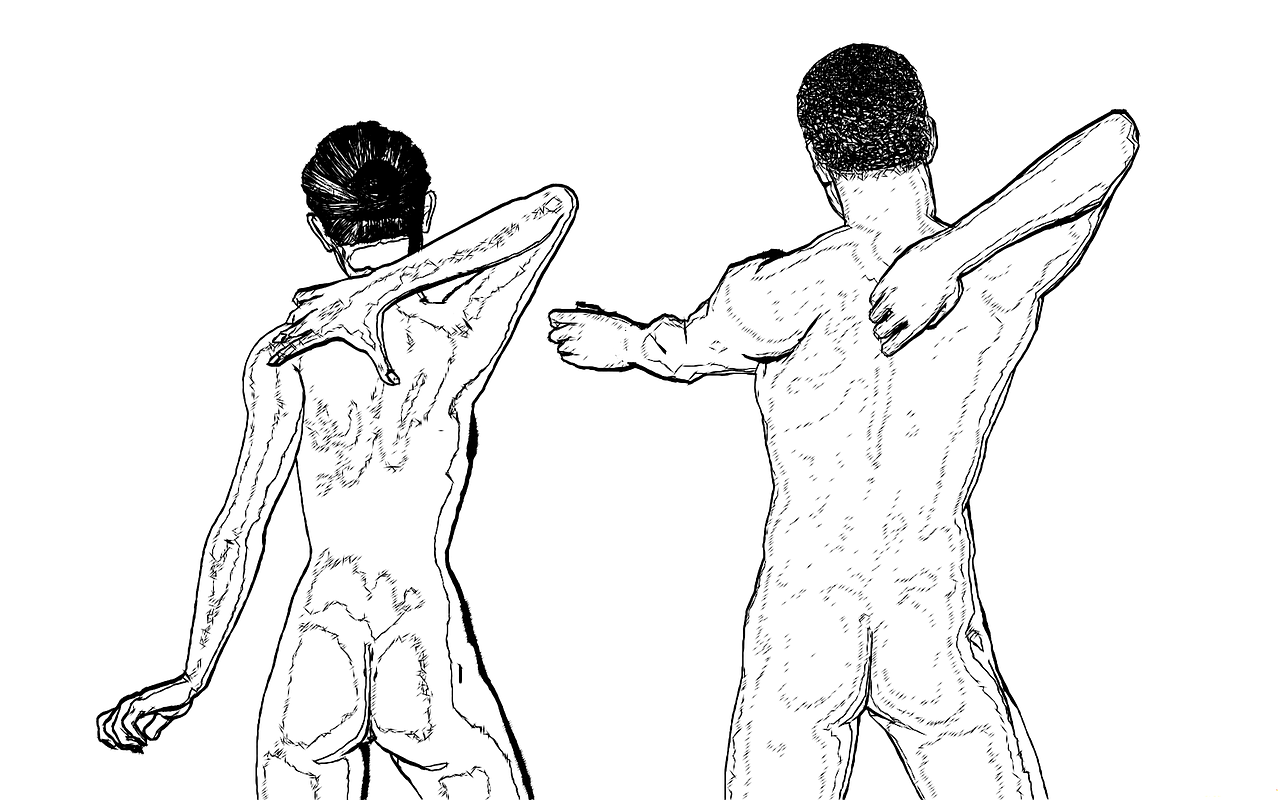
What Is the Connection Between Stress and Lumbar Spine Health?
Have you ever wondered if there is a link between stress and the health of your lumbar spine? You might be surprised to learn that there is indeed a connection. In today’s fast-paced and demanding world, stress has become a common occurrence for many of us. And it turns out that this constant state of stress can have a profound impact on our physical well-being, including the health of our lumbar spine. In this article, we will explore how stress affects the lumbar spine and what you can do to protect and support your back in times of stress. So, if you’re ready to learn more about this intriguing connection, let’s get started.
Effects of Stress on Lumbar Spine Health
Muscle Tension and Imbalance
When you experience stress, your muscles tend to tighten up and become tense as a natural response. This increase in muscle tension can specifically affect the muscles in your lumbar spine, leading to pain and discomfort. Prolonged muscle tension and imbalance caused by stress can result in chronic conditions such as muscle strain, spasms, and even muscle imbalances. These issues can further contribute to poor posture and limited mobility, putting additional strain on the lumbar spine.
Inflammation and Degeneration
Stress has been linked to the release of certain chemicals in the body that can trigger inflammation. Inflammation in the lumbar spine can lead to various conditions, including arthritis and intervertebral disc degeneration. Furthermore, chronic stress can also contribute to the breakdown of the spinal discs, resulting in herniated discs and increased pressure on the nerves in the lower back. This can lead to pain, numbness, and tingling sensations in the legs and feet.
Decreased Blood Flow
Stress triggers the body’s “fight or flight” response, causing blood vessels to constrict and reducing blood flow to certain areas of the body, including the lumbar spine. As a result, the spinal tissues may not receive sufficient oxygen and nutrients, impairing their ability to heal and maintain optimal function. Poor blood circulation can lead to weakened muscles, slowed tissue repair, and increased susceptibility to injuries or further damage to the lumbar spine.
Impaired Healing Process
Stress can negatively impact the body’s ability to heal and recover from injuries. When you’re stressed, your body’s energy is often diverted towards the stress response, which can hinder the healing process. As a result, any existing injuries or damage to the lumbar spine may take longer to heal, prolonging pain and discomfort. Additionally, stress can interfere with the production of collagen, a crucial protein for tissue repair, further impairing the healing process in the lumbar spine.
Stress-Related Risk Factors for Lumbar Spine Health
Sedentary Lifestyle
A sedentary lifestyle, characterized by long hours of sitting or inactivity, is often associated with high levels of stress. Regular physical activity is essential for maintaining the health of your lumbar spine, as it helps to strengthen the surrounding muscles, improve flexibility, and support proper posture. When you live a sedentary lifestyle, you are more likely to experience muscle weakness and imbalances, leading to increased stress on your lumbar spine and a higher susceptibility to injuries.
Poor Posture and Body Mechanics
Maintaining proper posture and body mechanics is crucial for ensuring the health and alignment of your lumbar spine. Stress can often cause individuals to slump or hunch their shoulders, leading to poor posture and increased strain on the lower back. Over time, this can result in muscle imbalances, spinal misalignments, and chronic pain in the lumbar spine. By practicing good posture and body mechanics, you can reduce the stress on your lumbar spine and minimize the risk of developing spinal conditions.
Obesity and Weight Gain
Chronic stress can also contribute to weight gain and obesity, both of which can have a detrimental effect on lumbar spine health. Excess weight puts additional pressure on the lumbar spine, leading to increased stress on the supporting structures and an elevated risk of developing conditions such as degenerative disc disease and osteoarthritis. Additionally, obesity is associated with increased inflammation in the body, further exacerbating the negative impact of stress on the lumbar spine.
Smoking and Alcohol Consumption
Both smoking and excessive alcohol consumption have been linked to negative effects on lumbar spine health. These habits can increase inflammation in the body, impair blood flow to the lumbar spine, and interfere with the healing process of spinal tissues. Furthermore, smoking has been shown to accelerate disc degeneration in the lumbar spine, leading to increased pain and reduced mobility. By reducing or eliminating these habits, you can decrease the negative impact of stress on your lumbar spine.

What Is the Connection Between Stress and Lumbar Spine Health?
Psychosocial Factors and Stress
Work-Related Stress
Work-related stress is a common source of chronic stress for many individuals. Long hours, a high workload, and demanding job responsibilities can contribute to increased stress levels, which can ultimately affect the health of your lumbar spine. The pressure and strain experienced in the workplace can lead to muscle tension, poor posture, and reduced physical activity, all of which can contribute to the development or exacerbation of lumbar spine issues. Finding ways to manage work-related stress is essential for maintaining the health of your lumbar spine.
Financial Stress
Financial stress can take a significant toll on both your mental and physical health. The constant worry and anxiety associated with financial difficulties can result in increased stress levels, which can manifest as muscle tension and imbalances in the lumbar spine. Additionally, financial stress may limit access to quality healthcare and preventive measures, leading to a higher risk of developing or aggravating lumbar spine conditions. Taking proactive steps to address and manage financial stress is crucial for the overall health of your lumbar spine.
Relationship Issues
Relationship problems, whether they be with a partner, family member, or friend, can cause significant emotional distress and contribute to heightened stress levels. Emotional distress, in turn, can lead to increased muscle tension and poor posture, placing strain on the lumbar spine. Additionally, relationship issues can disrupt sleep patterns, which can further aggravate stress levels and negatively impact lumbar spine health. Seeking support and addressing relationship issues can help alleviate stress and promote a healthier lumbar spine.
Emotional Distress
Emotional distress, such as anxiety, depression, or chronic stress, can have a profound effect on the health of your lumbar spine. These emotional states can cause an increase in muscle tension, affect sleep quality, and interfere with your ability to engage in physical activity. Furthermore, emotional distress can impair the body’s natural healing processes, prolonging the recovery time for any existing lumbar spine conditions. Seeking appropriate treatment and support for emotional distress is vital for maintaining the overall health of your lumbar spine.
Stress Management Techniques for Lumbar Spine Health
Physical Activity and Exercise
Engaging in regular physical activity and exercise is essential for managing stress and maintaining the health of your lumbar spine. Exercise helps to reduce muscle tension, strengthen the supporting muscles of the spine, improve blood flow, and release feel-good endorphins. Incorporating activities such as walking, swimming, yoga, or strength training into your routine can significantly reduce stress levels, improve posture, and enhance lumbar spine function.
Proper Posture and Body Mechanics
Practicing good posture and body mechanics is crucial for supporting your lumbar spine and minimizing the effects of stress. Maintaining a neutral spine alignment, avoiding slouching or hunching, and using ergonomically designed furniture can help alleviate strain on your lumbar spine. Additionally, being mindful of your body mechanics while lifting heavy objects or performing repetitive movements can prevent unnecessary stress on your lumbar spine.
Relaxation Techniques
Utilizing relaxation techniques can help reduce stress levels and promote the health of your lumbar spine. Techniques such as deep breathing exercises, meditation, progressive muscle relaxation, and guided imagery can all help to calm the mind and relax the body. By incorporating these techniques into your daily routine, you can effectively manage stress and alleviate tension in the muscles of your lumbar spine.
Healthy Lifestyle Habits
Maintaining a healthy lifestyle is crucial for managing stress and promoting the health of your lumbar spine. This includes adopting a well-balanced diet rich in nutrients, staying hydrated, getting enough sleep, and avoiding excessive alcohol or tobacco use. By nourishing your body and providing it with the necessary resources, you can better cope with stress and support the optimal functioning of your lumbar spine.

What Is the Connection Between Stress and Lumbar Spine Health?
The Role of Chiropractic Care in Managing Stress and Lumbar Spine Health
Spinal Manipulation and Alignment
Chiropractic care plays a significant role in managing stress and maintaining the health of your lumbar spine. Chiropractors use various techniques, such as spinal manipulations and adjustments, to realign the vertebrae of the spine. These treatments help to reduce muscle tension, improve joint mobility, and alleviate pain or discomfort associated with stress-related lumbar spine issues.
Stress Reduction and Coping Strategies
Chiropractors can also provide guidance and support in developing effective stress reduction and coping strategies. They may recommend lifestyle modifications, relaxation techniques, and exercises tailored to your specific needs. By addressing the underlying causes of stress and implementing appropriate strategies, chiropractic care can help you better manage stress and minimize its impact on your lumbar spine health.
Lifestyle Recommendations
In addition to spinal manipulations and stress reduction techniques, chiropractors can provide valuable lifestyle recommendations for maintaining a healthy lumbar spine. These recommendations may include exercise programs, ergonomic workplace modifications, proper lifting techniques, and advice on maintaining good posture. By incorporating these recommendations into your daily life, you can reduce the negative impact of stress and support the overall health of your lumbar spine.
Education and Prevention
Chiropractors play a vital role in educating patients about the connection between stress and lumbar spine health. They can provide valuable information regarding the impact of stress on the body, signs and symptoms to watch out for, and preventive measures to minimize the risk of developing lumbar spine issues. By empowering individuals with knowledge and preventive strategies, chiropractic care aims to prevent or address stress-related problems before they escalate.
The Mind-Body Connection: Stress and Lumbar Spine Health
Psychological Impact of Stress
Stress can have a profound psychological impact, affecting mood, cognitive function, and overall mental well-being. Psychological distress, such as anxiety or depression, can contribute to increased muscle tension, altered sleep patterns, and reduced engagement in healthy behaviors. These factors, combined with the physiological effects of stress, can significantly impact the health of your lumbar spine.
Psychoneuroimmunology and Inflammatory Responses
Psychoneuroimmunology explores the intricate relationship between the mind, the nervous system, and the immune system. Chronic stress can activate an inflammatory response in the body, which can contribute to the development or worsening of lumbar spine conditions. The release of stress hormones can also impair immune system functioning, further compromising the body’s ability to heal and maintain a healthy lumbar spine.
Effects of Stress on Nervous System Functioning
Stress can adversely affect the functioning of the central nervous system, which includes the brain and spinal cord. The central nervous system plays a crucial role in coordinating movements, perception of pain, and overall neurological functioning. Prolonged or excessive stress can disrupt these processes, resulting in increased muscle tension, altered pain perception, and an increased risk of developing or exacerbating lumbar spine issues.
Importance of Holistic Wellbeing
Understanding the mind-body connection is essential for promoting the health of your lumbar spine in the face of stress. Taking a holistic approach to wellbeing means addressing both the physical and psychological aspects of stress management. By adopting practices that promote overall health, such as regular physical activity, stress reduction techniques, and seeking support when needed, you can better support your lumbar spine health in stressful situations.

What Is the Connection Between Stress and Lumbar Spine Health?
Clinical Studies and Research on Stress and Lumbar Spine Health
Correlation Between Stress and Back Pain
Numerous studies have investigated the correlation between stress and back pain, including lumbar spine issues. Research has shown that individuals experiencing high levels of stress are more likely to report back pain and related symptoms. The specific mechanisms underlying this correlation vary but can include muscle tension, increased inflammation, and impaired healing processes. By addressing stress, individuals can potentially reduce the frequency and severity of back pain symptoms.
Longitudinal Studies on Stress and Spinal Health
Longitudinal studies conducted over extended periods have shed light on the long-term impact of stress on spinal health. These studies have shown that chronic stress can increase the risk of developing conditions such as degenerative disc disease, herniated discs, and spinal stenosis. Additionally, they have highlighted the importance of stress management interventions in preventing or delaying the onset of these spinal issues.
Impact of Stress Reduction Interventions
Research has also examined the effectiveness of stress reduction interventions in improving lumbar spine health. Studies have found that techniques such as cognitive-behavioral therapy, relaxation exercises, and mindfulness-based stress reduction can significantly reduce stress levels and improve outcomes for individuals with lumbar spine issues. These interventions help to address both the physical and psychological aspects of stress, promoting overall well-being and supporting the health of the lumbar spine.
Preventive Measures for Maintaining a Healthy Lumbar Spine in Stressful Environments
Ergonomic Workspaces and Supportive Furniture
Creating an ergonomic workspace is crucial for maintaining a healthy lumbar spine, especially in stressful environments such as the workplace. Using an ergonomic chair, an adjustable desk, and proper desk accessories can promote good posture and minimize stress on the lumbar spine. Additionally, implementing regular breaks and incorporating stretching exercises throughout the workday can reduce muscle tension and improve circulation in the lumbar spine.
Stress Reduction Programs in the Workplace
Employers can play a significant role in promoting the health of employees’ lumbar spines by implementing stress reduction programs in the workplace. These programs may include yoga or meditation classes, educational workshops on stress management, or providing access to mental health resources. By addressing stress at the workplace, employers can help employees better cope with stress and minimize its impact on their lumbar spine health.
Regular Movement and Stretching Breaks
Incorporating regular movement and stretching breaks into your daily routine is crucial for maintaining a healthy lumbar spine, especially in stressful environments. Taking short breaks to walk, stretch, or engage in light exercises can help reduce muscle tension, improve blood flow, and promote spinal health. Additionally, incorporating stretching exercises specifically targeting the lumbar spine can alleviate stress and improve flexibility in the lower back.
Eating a Balanced Diet
Maintaining a balanced diet is important for overall health, including the health of your lumbar spine, especially in times of stress. Consuming a diet rich in fruits, vegetables, lean proteins, and whole grains provides your body with the necessary nutrients to support tissue repair and reduce inflammation. Additionally, staying hydrated by drinking plenty of water can promote optimal functioning and healing of the lumbar spine.

What Is the Connection Between Stress and Lumbar Spine Health?
Understanding Stress and Its Effect on the Body
Definition and Types of Stress
Stress is a natural physiological response to a perceived threat or demand, whether it be physical, mental, or emotional. It can be classified into acute stress, which is short-term and temporary, and chronic stress, which is prolonged and persistent. Acute stress can mobilize the body’s resources to deal with immediate challenges, while chronic stress can have a detrimental effect on overall health, including the lumbar spine.
Physiological Responses to Stress
When you experience stress, your body releases stress hormones such as cortisol and adrenaline. These hormones trigger various physiological responses, including an increased heart rate, elevated blood pressure, and heightened muscle tension. While these responses are helpful in short-term stress situations, prolonged activation can have negative effects on the body, including the lumbar spine.
Chronic Stress and its Health Consequences
Chronic stress can have a wide range of health consequences, both physical and psychological. It has been associated with an increased risk of developing conditions such as cardiovascular disease, diabetes, and mental health disorders. Additionally, chronic stress can exacerbate existing health issues, including those affecting the lumbar spine. By understanding the impact of chronic stress, individuals can take proactive steps to manage and reduce stress levels.
Recognizing Signs and Symptoms of Stress
Recognizing the signs and symptoms of stress is crucial for identifying and addressing high stress levels before they negatively impact lumbar spine health. Physical signs of stress may include headaches, muscle tension, back pain, and fatigue. Psychological symptoms can manifest as anxiety, irritability, mood swings, or difficulty concentrating. By being aware of these signs and symptoms, individuals can seek appropriate support and implement stress management strategies to mitigate the impact on lumbar spine health.
Conclusion
Stress can have a significant impact on the health of your lumbar spine, affecting muscle tension, inflammation, blood flow, and the healing process. Various risk factors, including a sedentary lifestyle, poor posture, obesity, smoking, and alcohol consumption, can further exacerbate the negative effects of stress on the lumbar spine. However, by implementing stress management techniques, such as physical activity, proper posture, relaxation techniques, and adopting healthy lifestyle habits, you can promote the health of your lumbar spine in stressful situations. Chiropractic care plays a vital role in managing stress and supporting lumbar spine health through spinal manipulations, stress reduction strategies, lifestyle recommendations, and education. Understanding the mind-body connection and the impact of stress on the nervous and immune systems is crucial for promoting overall wellbeing and supporting a healthy lumbar spine. Through clinical studies and research, the correlation between stress and lumbar spine health has been established, highlighting the need for stress reduction interventions and preventive measures. By incorporating ergonomic workspaces, stress reduction programs, regular movement and stretching breaks, and a balanced diet, individuals can maintain a healthy lumbar spine in stressful environments. Overall, recognizing the effects of stress on the body, understanding its physiological responses, and recognizing signs and symptoms are key to managing stress and preserving the health of the lumbar spine.









